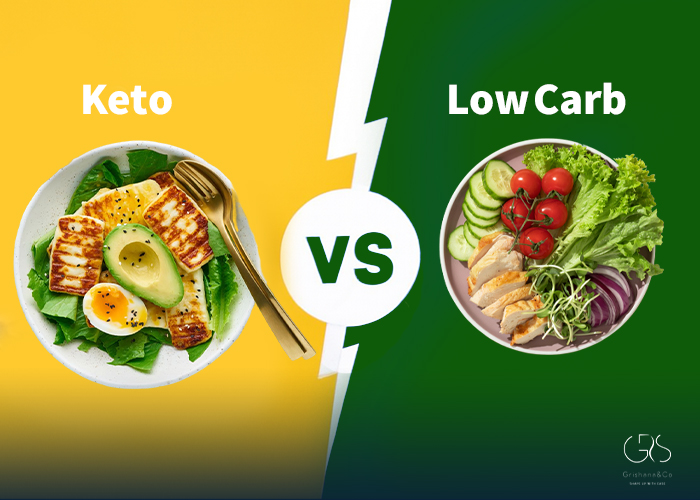In the ever-evolving world of nutrition and weight loss, few topics have sparked as much interest and debate as low-carb and ketogenic (keto) diets. Both approaches focus on reducing carbohydrate intake, but they do so in different ways and with different goals in mind. If you’re wondering whether a low-carb or keto diet is better for you, it’s important to understand how they work, what the science says, and how they might fit into your lifestyle and health goals.
This article breaks down the similarities, differences, scientific evidence, and practical considerations to help you decide which approach — if any — is right for you.
Understanding Carbohydrates: The Basics
Carbohydrates are one of the three main macronutrients that provide energy, alongside proteins and fats. They come in various forms — sugars, starches, and fiber — and are found in foods like grains, fruits, vegetables, legumes, and dairy.
When you eat carbohydrates, your body breaks them down into glucose, which is the primary fuel source for your brain, muscles, and other tissues. For most people eating a standard diet, carbohydrates make up about 45% to 65% of daily caloric intake, according to the U.S. Dietary Guidelines.
However, reducing carb intake has been shown to support weight loss, improve blood sugar control, and potentially offer other metabolic benefits. That’s where low-carb and keto diets come in.
What Is a Low-Carb Diet?
A low-carb diet is an eating pattern that limits carbohydrate intake below the typical dietary guidelines. There is no single definition, but most low-carb diets restrict carbs to somewhere between 50 and 150 grams per day, depending on the plan and individual needs.
Low-carb diets often emphasize:
- Protein: Lean meats, fish, eggs, dairy.
- Healthy fats: Olive oil, nuts, seeds, avocado.
- Low-carb vegetables: Leafy greens, broccoli, peppers.
- Limited grains, starchy vegetables, sugary foods.
Popular variations include the Atkins Diet, Paleo Diet, and other flexible carb-controlled plans.(If you’re interested in reading about the benefits of the Paleo diet.)
The goal of a low-carb diet is to reduce spikes in blood sugar and insulin, encourage the body to burn fat for energy, and support weight management.
(I suggest you read my article on avocado consumption. It provides more information on the topic)

What Is the Keto Diet?
The ketogenic diet is an ultra-low-carb, high-fat diet designed to shift your metabolism into a state called ketosis.
In ketosis, the body burns fat — both dietary fat and stored body fat — for fuel instead of glucose. This produces molecules called ketones, which provide energy for your brain and body when carbs are scarce.
A standard keto diet typically restricts carbs to around 20–50 grams per day, which is significantly lower than most low-carb plans. To meet your energy needs, keto emphasizes high fat intake (about 70–80% of total calories) and moderate protein.

Typical keto-friendly foods include:
- Fatty cuts of meat, poultry, fish.
- Eggs.
- Full-fat dairy.
- Oils and butter.
- Nuts and seeds.
- Non-starchy vegetables.
- Minimal fruits, except small portions of berries.
(I recommend that you read about keto diet fruits)
Key Similarities Between Low-Carb and Keto
Both diets share some core features:
- Carb Reduction: Both restrict carbohydrate intake compared to a standard diet.
- Blood Sugar Control: Both can lower blood glucose and insulin levels.
- Emphasis on Whole Foods: Both encourage cutting out processed foods, refined grains, and added sugars.
- Potential Weight Loss: Both can promote weight loss by reducing appetite and encouraging the body to burn stored fat.
How They Differ
While low-carb and keto overlap, there are crucial differences:
Degree of Carb Restriction
- Low-carb diets are flexible; you might eat 50–150 grams of carbs per day.
- Keto is strict; you usually need to stay under 50 grams, often closer to 20–30 grams to maintain ketosis.
Metabolic State
- Low-carb diets don’t necessarily put you into ketosis — your body still uses glucose as its main fuel.
- Keto diets aim specifically to induce ketosis so that ketones become your primary energy source.
Macronutrient Ratios
- Low-carb diets vary in fat and protein ratios; they don’t require high fat.
- Keto diets are explicitly high-fat, moderate protein, very low-carb.
Flexibility
- Low-carb diets allow more food variety — small portions of fruit, legumes, whole grains in moderation.
- Keto diets are more restrictive, eliminating most fruits, grains, and starchy vegetables.
Scientific Evidence: What Does Research Say?
Weight Loss
Both diets can support weight loss. A meta-analysis in The American Journal of Clinical Nutrition found that low-carb diets lead to greater short-term weight loss than low-fat diets.
For keto, some studies suggest it can lead to faster initial weight loss due to diuresis (water loss) and greater appetite suppression from ketones. However, over the long term (12+ months), the difference often narrows. Adherence becomes the biggest factor.
A systematic review published in Obesity Reviews found that while keto can help reduce weight and improve metabolic markers, results are comparable to other calorie-restricted diets when calories and protein are matched.
Blood Sugar and Insulin
Low-carb and keto diets can both improve blood sugar control — especially useful for people with type 2 diabetes or prediabetes.
A review in Nutrients (2019) concluded that low-carb diets significantly reduce HbA1c (a marker of long-term blood sugar) and may reduce the need for diabetes medication.
The ketogenic diet, because of its strict carb limits, often produces even more dramatic reductions in blood sugar and insulin levels. Some people with type 2 diabetes have been able to put the disease into remission with keto, under medical supervision.
Heart Health
This is an area of debate.
Low-carb and keto diets often increase intake of saturated fat, which has raised concerns about cholesterol levels and heart disease risk. However, recent studies show mixed results.
Some people see increases in LDL cholesterol (the so-called “bad” cholesterol) on keto, but often with an increase in HDL (“good” cholesterol) and reductions in triglycerides, which may offset risk factors.
A 2020 review in Current Opinion in Endocrinology, Diabetes and Obesity suggests that individual responses vary greatly — some people’s LDL rises significantly on keto, while others see no change or even a drop.
Gut Health
Cutting carbs can reduce intake of fiber if you’re not careful. This can negatively impact gut microbiota diversity and digestive health.
Low-carb diets are often easier to balance with fiber-rich vegetables, nuts, and seeds. The stricter keto diet can make it harder to get enough fiber unless you’re strategic with non-starchy veggies and seeds like chia or flax.
Who Should Consider Low-Carb?
A low-carb diet may be a good fit if you:
- Want moderate weight loss without strict rules.
- Prefer more flexibility and food variety.
- Are looking to manage blood sugar without drastic changes.
- Have difficulty sticking to very restrictive plans.
- Enjoy including fruits, legumes, or occasional whole grains.
Low-carb diets are generally easier to sustain long term, making them a practical choice for many people.
Who Might Benefit from Keto?
A ketogenic diet might be worth considering if you:
- Have significant weight to lose and want fast results.
- Are managing type 2 diabetes or insulin resistance (with medical guidance).
- Have epilepsy — keto is an established therapy for drug-resistant epilepsy.
- Feel best with fewer carbs and more fats.
- Are prepared for strict food rules and close tracking.
However, keto is more restrictive, can be harder to maintain, and may not be ideal for everyone — especially athletes needing quick energy or people with certain medical conditions.
Potential Risks and Side Effects
Both diets are generally safe for healthy people, but there are some considerations:
Low-Carb:
- May cause initial fatigue, headaches (“carb flu”), or constipation.
- May be difficult for people with certain metabolic conditions if not well planned.
Keto:
- Keto flu: fatigue, nausea, headache as your body adapts.
- Risk of nutrient deficiencies if the diet lacks variety.
- Possible increase in LDL cholesterol for some.
- Can be socially restrictive and mentally challenging.
- Not recommended for people with liver or pancreatic disease without medical supervision.
Practical Tips for Choosing
- Talk to Your Doctor: Especially if you have diabetes, heart disease, or other health conditions.
- Start Small: If you’re new to carb restriction, begin with a moderate low-carb plan. Gradually reduce carbs rather than jumping straight into keto.
- Plan for Balance: Prioritize vegetables, healthy fats (olive oil, avocado), and quality protein.
- Stay Hydrated and Mind Electrolytes: Both diets can affect water and sodium balance.
- Track Progress, but Be Flexible: Listen to your body. If a diet feels unsustainable or affects your mood, energy, or health markers negatively, adjust.
- Think Long-Term: The best diet is one you can stick with and that supports your health — physically and mentally.
Conclusion
Both low-carb and keto diets can help people lose weight, manage blood sugar, and improve metabolic health. They share core principles but differ in strictness and metabolic effects.
Low-carb offers flexibility, sustainability, and easier social fit. Keto is stricter but may deliver faster results for weight loss and diabetes management — if you can maintain it safely.
No one-size-fits-all solution exists. What matters most is choosing an approach that aligns with your lifestyle, preferences, medical needs, and long-term goals.
Before starting any major dietary change, consult a healthcare provider or a registered dietitian to ensure it’s safe and tailored for you.
Sources
- Wiley.Onlinelibrary, Systematic review and meta-analysis of clinical trials of the effects of low carbohydrate diets on cardiovascular risk factors
- BMJ Open Diabetes Research & Care, Systematic review and meta-analysis of dietary carbohydrate restriction in patients with type 2 diabetes
- Frontiers, Ketogenic Diets and Chronic Disease: Weighing the Benefits Against the Risks










